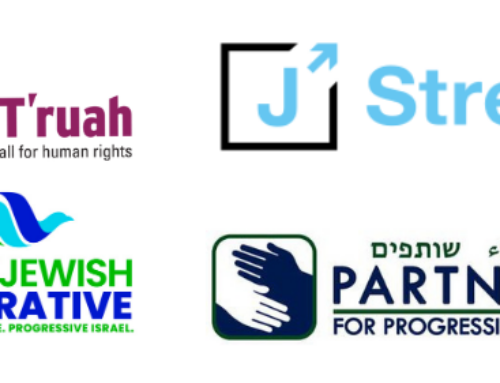I’m not the type of person you’d expect to find working at an organization like Meretz USA. I’m conflicted about considering myself a Zionist.
I should explain. I grew up identifying as Jewish and, thus, felt that I had a natural connection to Israel, but I never knew what that meant: my family was not part of the Jewish community and Israel was never a topic that was raised during family discussions; nor did I ever take classes on the history of Israel or Zionism.
As a result, prior to Meretz USA, my principal understanding of Zionism came from my college semester abroad, which I spent in Jordan. Prior to arriving in Jordan, I never considered how living in an Arab country would affect my sense of Judaism and my understanding of Israel. And although living there made me feel more proud of my Jewish identity, I also became heavily influenced by the Arab narrative, which viewed Zionism as inherently immoral. Returning from my semester, I did not realize that any other conception of Zionism existed.
Meretz USA began to help me redefine Zionism even before I started working here. I was intrigued by the job advertisement because of it focus on the Israeli-Palestinian conflict. And when I began to poke around on the website, I found – I admit, to my surprise – that I shared each of the organization’s values.
My understanding of Zionism has continued to evolve, and my time at Meretz USA has confirmed to me that I can be a part of the progressive Jewish community. Organizations like Meretz USA, which envision a democratic, equal, and peaceful Israel, succeed where Jewish organizations which focus solely on Israel’s need for security fail. They reach Jews like me, who desire a connection to Israel, but not a connection that overlooks the state’s internal flaws and human rights abuses in the West Bank and Gaza.
As I came to know more fully the principles on which Meretz USA stands, and as I came to interact with the people involved in Meretz USA, I also came to understand what I didn’t before: that Zionism doesn’t equal aggression or oppression. That there are Zionists out there who believe, as I do, that it is in Israel’s best interest to give up its control over the West Bank and Gaza Strip, and that it is necessary for Israel to take risks in order to reach peace with its neighbors.
Perhaps the most significant opportunity that Meretz USA provided me was the ability to participate in the “Peace, Pluralism, and Social Justice” Birthright trip run by the Union of Progressive Zionists last summer as well as the chance to organize and lead a subsequent trip into the West Bank. My experiences on these trips revealed to me sides of Israel that I had not seen before. I came to know Israelis and to better understand the fear that exists when a group lives so close to many who would do them harm. But I also saw the grave human rights abuses perpetrated on the Palestinian people in the name of Israeli security. These encounters hid neither reality.
The complexity and confusion that comes from acknowledging the rights and wrongs on both sides of the conflict, is what I believe organizations like Meretz USA stand for and what progressive Zionism is about. I see as Meretz USA’s role to reach out to the Jewish community, specifically to those who don’t know about or choose to ignore Israel’s share of responsibility for the continuing conflict, and to those (like me, two years ago) who don’t realize that many Israelis and Zionists are committed to its peaceful and just resolution.
My experiences at Meretz USA made me realize the importance of understanding other perspectives in resolving conflict. As a result, I am leaving Meretz USA to go on to a doctorate in international education and hope to make a career of educating to that end. As for Meretz USA, I wish the organization success as it helps to redefine the American Zionist discourse, bringing a more balanced and nuanced perspective to a conflict that defies simplistic explanations.



Leave A Comment